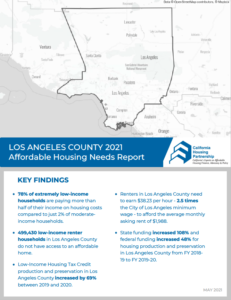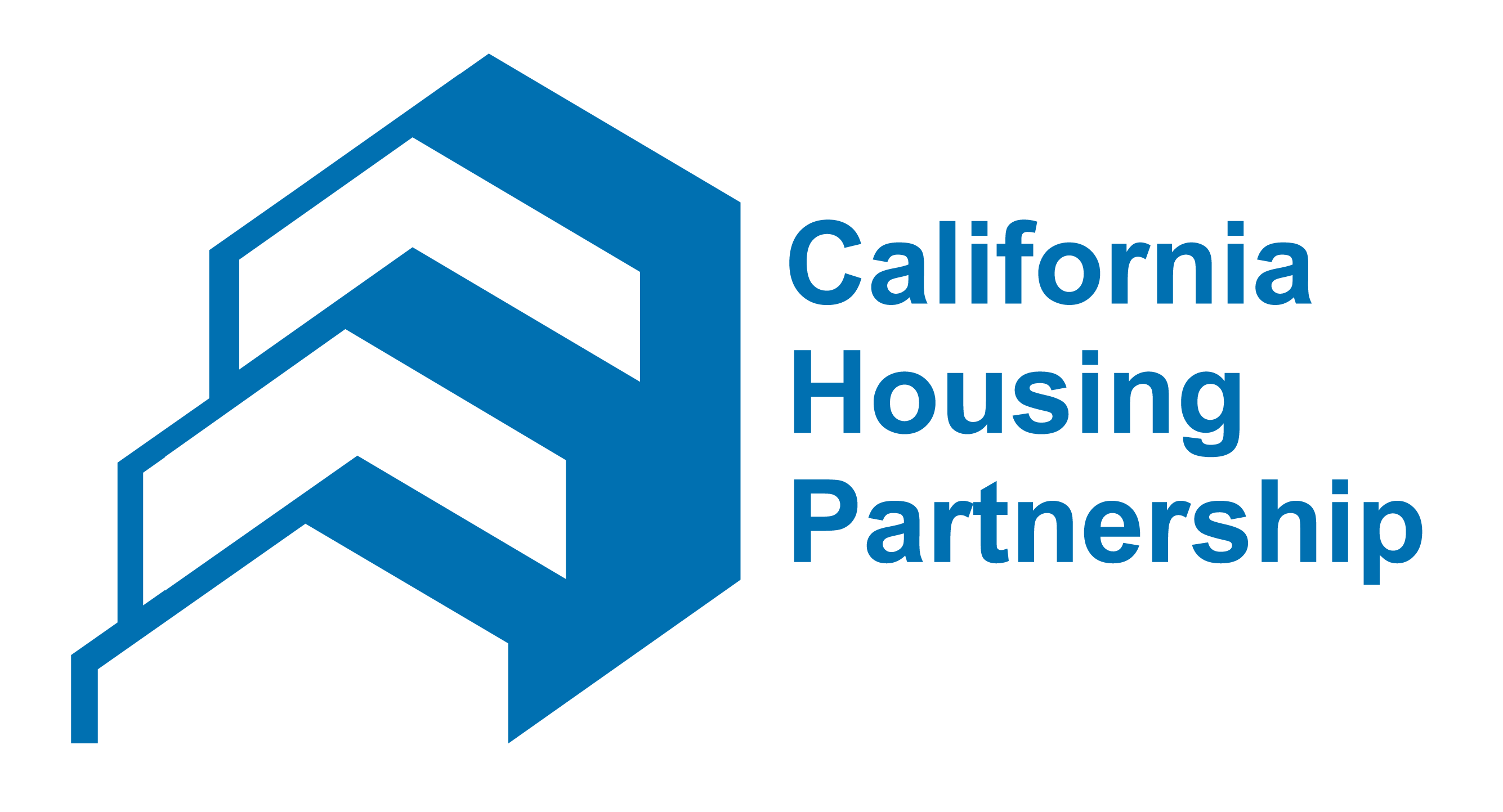FOR IMMEDIATE RELEASE
Media Contacts:
Jeannette Brown, SCANPH
Christina Gotuaco, California Housing Partnership
Alan Greenlee, SCANPH
Low-Income Renters See No Relief in Post-COVID-19 Recovery; New Data Shows Crisis-Level Deficit of Affordable Housing
New Report Builds Case for Action
 May 26, 2021 (Los Angeles, CA) – As California begins to open back up as part of the COVID-19 recovery, new data shows that the recovery is inequitable for low-income renters struggling to keep up with ever-increasing housing costs, as 499,430 households in Los Angeles County do not have access to an affordable home and are bearing the brunt of a staggering deficit of affordable housing. As such, hundreds of thousands of low-income renters are getting left behind as the cost of living soars out of reach for Los Angeles County’s low-income families, which poses a severe risk of exacerbating the region’s homelessness crisis. While state and federal funding has increased from FY 2018-19 to FY 2019-2020 for housing production and preservation, the severe imbalance in housing supply for low-income renters is a monumental gap to overcome without more urgent investments in affordable housing and highly targeted housing resources for the County’s most vulnerable working families.
May 26, 2021 (Los Angeles, CA) – As California begins to open back up as part of the COVID-19 recovery, new data shows that the recovery is inequitable for low-income renters struggling to keep up with ever-increasing housing costs, as 499,430 households in Los Angeles County do not have access to an affordable home and are bearing the brunt of a staggering deficit of affordable housing. As such, hundreds of thousands of low-income renters are getting left behind as the cost of living soars out of reach for Los Angeles County’s low-income families, which poses a severe risk of exacerbating the region’s homelessness crisis. While state and federal funding has increased from FY 2018-19 to FY 2019-2020 for housing production and preservation, the severe imbalance in housing supply for low-income renters is a monumental gap to overcome without more urgent investments in affordable housing and highly targeted housing resources for the County’s most vulnerable working families.
The California Housing Partnership published its annual Housing Needs Assessment data today for Los Angeles County, which provides a comprehensive snapshot of the region’s current housing needs and challenges. Key findings:
- There is a current shortfall of 499,430 affordable rental homes in LA County.
- The median asking rent in the county is $1,988 and renters need to earn 2.5 times minimum wage, or $38.23 per hour, to afford these housing costs.
- The county’s lowest income households are disproportionately cost burdened, with 78% of extremely low-income people paying more than half their income on housing costs compared to just 2% of moderate income households.
“We urge state leaders to set clear, long-term goals so that the uses of this year’s state budget surplus are framed as down-payments on the sustained investments at scale that our region and state need to meet the four clear goals of California’s Roadmap Home 2030: ending homelessness, closing the affordable housing gap, protecting low-income renters, and advancing racial equity,” said Matt Schwartz, president and CEO of the California Housing Partnership.
In collaboration with the Southern California Association of Nonprofit Housing (SCANPH), the new report outlines various local policy recommendations to address the reports’ findings.
“We’ve seen an influx of policy proposals that would misguidedly prioritize short-term solutions for our region’s housing crisis but it will always remain true that investments in long term solutions like more affordable housing production are the surest way to ensure we can meet the needs of our diverse communities who are struggling after a destabilizing year that has left many personal finances even more vulnerable for working families. Now more than ever, let’s ensure that resources go to those most in need and we reduce development barriers so that we can expediently serve the housing needs of low-income renters,” said Alan Greenlee, SCANPH Executive Director.
In response, SCANPH’s local policy recommendations include:
- Establishing a new, recurring revenue source to capitalize on the County’s affordable housing fund (parcel tax, utility tax, sales tax, etc.).
- Planning for service needs of permanent supportive housing; allocating funds to ensure integrated case management series will continue at PSH units, especially after Measure H sunsets in six years.
- Expanding a version of the City of Los Angeles’ Transit Oriented Communities at the county level, with higher low-income and extremely low income percentages.
View the Los Angeles County report.
View the Local Recommendations.
###
About the California Housing Partnership
The California Housing Partnership creates and preserves affordable and sustainable homes for Californians with low incomes by providing expert financial and policy solutions to nonprofit and public partners. Since 1988, the Partnership’s on-the-ground technical assistance, applied research, and legislative leadership has leveraged $25 billion in private and public financing to preserve and create more than 75,000 affordable homes. In addition, the Partnership provides statewide data tools for housing research and advocacy. | chpc.net
About the Southern California Association of Nonprofit Housing
The Southern California Association of Nonprofit Housing (SCANPH) is a trade association, founded in 1985, that supports and advocates for those dedicated to the development of affordable housing. SCANPH’s advocacy efforts have contributed greatly toward assisting the financially vulnerable in our communities since 1985. The mission of SCANPH is to facilitate development of affordable homes across southern California by advancing effective public policies, sustainable financial resources, strong member organizations, and beneficial partnerships. | www.scanph.org
